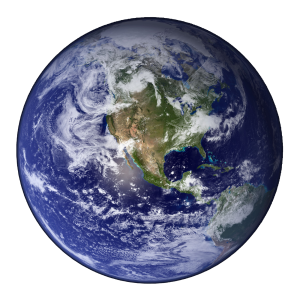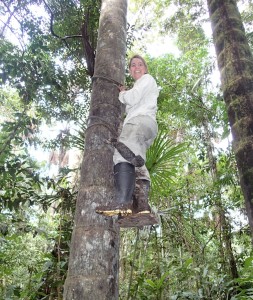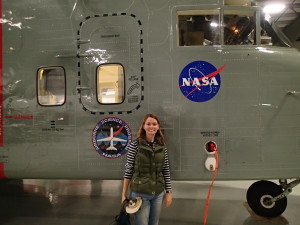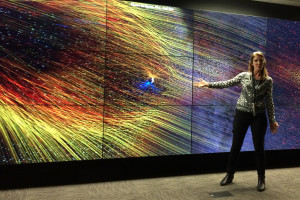
How did you discover your passion for Earth Science?
I’ve had a passion for environmental issues since I was young. When I graduated from college I thought I wanted to go the policy route so became an Urban Planner, but then I was lucky enough to attend the International School for Geo_Information Science and Earth Observation in the Netherlands for 2 years and discovered that I really loved looking at Earth from space. When I returned from the Netherlands I got a job at NASA Ames Research Center in the Earth Science Division and decided that’s what I wanted to do.
What do you enjoy most about what you do?
So many things. I primarily work in Applied Sciences which means that I help transfer NASA Earth Science data and technology to federal, state, tribal and international organizations to enhance their decision support. I really enjoy teaching organizations and individuals about NASA remote sensing and learning more about what those organizations do. This job is not only about learning and teaching NASA Earth Science data and technology but it’s also about developing relationships with potential users of the technology. I’ve worked in many different areas from mapping vineyard health to monitoring vector borne diseases. I have been able to travel to many interesting places including many different states and countries including Kenya and Italy. I also love mentoring students. I have been lucky enough to be the science mentor for the NASA DEVELOP internship program for 12 years, plus involved with mentoring Native American students as well. Being a science mentor is extremely rewarding especially when those students continue to work in Earth science.
What inspired you to work in this field?
My passion for the environment and managing natural resources were my primary inspiration. Something about being able to observe the Earth from space really resonated with me. Being able to see the “big picture” with satellite imagery was very exciting and inspiring.
Where do you work and do you remember what it was like on your first day of work?
I work in the Earth Science Division at NASA Ames Research Center. I was really intimidated and nervous on my first day of work since I knew a little about satellite imagery but not as much as everyone at Ames. I learned almost everything I know about processing satellite imagery at Ames and although the learning curve was quite steep, I had wonderful mentors to help me through.
What are some of the most important lessons you have learned in your life?
I’ve learned that you really need to do what interests you. You need to find a job that you find interesting and challenging and you need to find time for interests outside of your job. I’ve also learned that you need to be flexible and open to different opportunities that come your way.
What do you consider your greatest accomplishment?
My greatest accomplishment was recently getting my PhD. My career path has not been very traditional, so although I’ve worked at NASA for a very long time, I did not pursue my doctorate until very recently. It was a dream of mine for a very long time but having a family and spending quality time with my daughters became my priority. Once they were old enough, my husband and I decided it would be a good time to pursue a doctorate. So in 2004 I received my doctorate at the age of 52!
What was the most difficult moment of your career? What did you learn?
One of the most difficult moments of my career was when NASA unexpectedly pulled the funding from 2 multi-year projects of mine after one year due to funding cuts. I was left with almost no funding and had to figure out what to do. I considered going back to school to get a Masters degree in Education but a colleague convinced me that I should pursue my dream of getting a PhD in a science field. That decision has changed my life in so many ways. Not only did it enable me to learn about the latest research in the field but it also gave me additional self-confidence. I am lucky enough to currently be working as an Associate Program manager for NASA Headquarters in large part because of this path I chose to take.
Who has been the biggest influence on your life, and what lessons did they teach you?
I don’t think there has been any one person who has had the biggest influence on my life. My influences come from many different places in time and space, from my dad and my husband who have the most positive energy and outlook on life, to my co-workers who I can always go to for advice.
How has your career been different than what you’d imagined?
When I started working after college, I thought I would be focusing on environmental policy and planning. I never would have imagined in a million years that I would be a scientist at NASA.
Did you have to overcome any gender barriers in your career?
Yes, especially when I was younger. There were very few women working in this field so I felt it was very difficult to be taken seriously. Several of my female colleagues and I had to deal with sexual harassment issues.
What does your future hold?
I really love working at NASA and hope to continue to do so until I retire. My husband also works at NASA so we are a real NASA family. I am very interested in project and program management so I hope to get the opportunity to work at NASA Headquarters for a year or two.
What one piece of advice would you like to pass on to the next generation?
This is so cliché, but follow your passion….do what you really want to do. And I truly believe that a successful career is 75% (or more) about developing good relationships with your co-workers, bosses, collaborators, etc…




